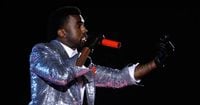Kanye West, the controversial rapper now known as Ye, made headlines again on May 8, 2025, with the release of his latest music video for the song titled "Heil Hitler." The release, which coincided with VE Day—the anniversary of the defeat of the Nazi regime—has sparked outrage and condemnation across various communities and social media platforms.
The music video features men of color draped in animal skins, chanting the chorus of the song, which includes lyrics that express West's justifications for adopting Nazi ideology. In the song, he claims that his struggles with co-parenting his children with ex-wife Kim Kardashian have led him to embrace such extreme views. He also references ongoing legal battles and allegations of controlling his wife's wardrobe, particularly highlighting a sheer dress she wore to the 2025 Grammy Awards.
In a shocking twist, the song concludes with a sampling of a speech by Adolf Hitler from the 1930s, which has further fueled the backlash against West. The immediate response from streaming platforms was to ban "Heil Hitler" almost as soon as it was released. West took to social media to express his frustration, tweeting, "Heil Hitler by Ye has been banned by all digital streaming platforms while Rednecks by Randy Newman remains streamable. They’re literally keeping the n—-s down," as reported by Billboard.
West's controversial actions are not new; earlier in 2025, he purchased a Super Bowl television advertisement to promote swastika-emblazoned T-shirts, further solidifying his pattern of antisemitic provocations. The Anti-Defamation League (ADL) quickly condemned the release, calling it a "serious threat to our society." The ADL urged Spotify and other platforms to remove the song, stating that West's actions are part of a broader campaign to normalize Nazi language.
Jim Berk, CEO of the Simon Wiesenthal Center, also weighed in, describing the song as "hate speech, pure and simple." He criticized the timing of the release on VE Day and called on social media platforms to enforce their own policies against hate speech more rigorously. Berk stated, "We call on X to remove West from its platform and for other platforms and distributors to refuse to host or monetize this song. There must be a clear line when it comes to glorification of genocidal regimes, particularly to millions of young people."
Despite the backlash, West remains defiant. He has vowed to perform "Heil Hitler" at all his upcoming shows, asserting that he will not be silenced. This determination has led to mixed reactions online, with some users expressing disbelief at the absurdity of the situation. One user noted, "Kanye West will be remembered as one of the greatest artists who destroyed his own legacy," while another remarked, "The silver lining here is that actual Hitler would absolutely hate this."
West's provocative style has drawn criticism not only from the Jewish community but also from a broader audience concerned about the normalization of hate speech. Ted Deutch, CEO of the American Jewish Committee, labeled the song as "blatant antisemitism," reinforcing the sentiment that West's actions are contributing to a dangerous narrative.
The music video's imagery and lyrics have been scrutinized for their potential impact on young audiences. Critics argue that glorifying such ideologies can lead to a desensitization to hate and violence, particularly among impressionable listeners. The Simon Wiesenthal Center's Berk emphasized the importance of holding artists accountable for their messages, stating, "His partner in spreading dangerous vitriol against Jews is X, which is allowing flagrant violation of its own rules regarding hate speech."
As the fallout from West's latest release continues to unfold, the conversation around accountability in the music industry and social media platforms remains critical. Many are calling for stricter regulations to prevent the spread of hate speech in artistic expressions.
The controversy surrounding "Heil Hitler" is not just about one song; it reflects a larger issue of how society grapples with the intersection of art, free speech, and the responsibilities of artists to their audiences. As West continues to provoke and challenge societal norms, the implications of his actions will likely reverberate far beyond the music industry.
In this climate of heightened sensitivity to hate speech and its consequences, the public's response to West's latest endeavor will be closely watched. Will this latest controversy lead to a reevaluation of how artists express themselves, or will it simply be another chapter in a long history of provocative statements by West?
As discussions around the implications of West's actions continue, it is clear that the conversation about hate speech, artistic freedom, and accountability is far from over. The public's reaction will play a significant role in shaping the future of artistic expression in an increasingly polarized society.





